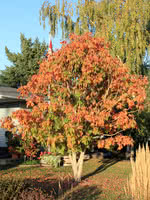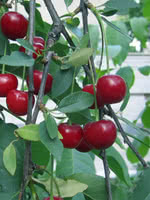Mon-Fri 9am - 5pm Mountain time
Ohio Buckeye vs Sour Cherry
Aesculus glabra
Prunus cerasus
SOLD OUT
Ohio Buckeye is a medium sized deciduous tree. If you are looking for a shade tree, Ohio Buckeye's dense canopy of unique leaves can provide it.
Named after its fruit, an inedible nut enclosed in a prickly husk, Ohio Buckeye also features green-yellow flowers and long, broad leaves that turn brilliant red in the fall.
Slow growing, but an extremely attractive tree. Find out what experienced horticulturalists already know: this tree is a gem.
Sour Cherry is cold-hardy and typically grows as a small tree. In late spring, it produces clusters of fragrant white blossoms that mature into bright red, tart fruit. Although the cherries can be eaten fresh, they are most commonly used in baking and preserves.
While not native to North America, Sour Cherry serves as a larval host plant for the Eastern Tiger Swallowtail (Papilio glaucus), a butterfly native to eastern North America.
Sour cherries are self-fertile; however, planting near additional cherry trees for cross-pollination can increase yields.
This Sour Cherry is produced from seed collected from an Evans Cherry and is not clonally reproduced.
Ohio Buckeye Quick Facts
Sour Cherry Quick Facts
Toxicity: nuts are toxic to humans and cattle

